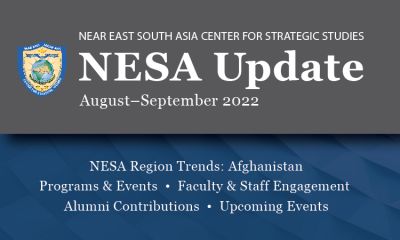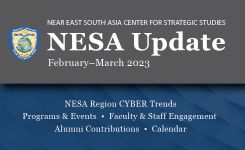- Near East South Asia Center for Strategic Studies
- NESA Center Update: August-September 2022
NESA Center Update: August-September 2022
0 comments

December 2, 2022, Near East South Asia Center for Strategic Studies
The NESA Center August–September 2022 Update focuses on Near East South Asia Region trends regarding Afghanistan.
The update also highlights August through September 2022 NESA Center programs & events, faculty & staff engagements, alumni contributions, and upcoming events.
August–September 2022 Afghanistan Trends:
- 15 August 2022 marked the first anniversary of the Taliban rule in Afghanistan. During the past year, the country has slipped further and further into political and economic decline with little hope for a quick recovery. Now, more than one year after the fall of Afghanistan to the Taliban, the country remains politically unstable, economically bankrupt, and socially fragmented. The clerics’ regime continues to monopolize power with no intention of including non-Taliban elements in key government positions or in the security forces. Returning to their repressive rule of the 1990s, the Taliban Emirate has tightened control by restricting independent media, banning women from most government positions, and closing high school education for girls.
- The international community, including the United States, continues to raise serious concerns over the presence of global Jihadist groups, including al-Qaeda in Afghanistan. The threat of terrorism is seen as more real following the appearance of the al-Qaeda leader Ayman al-Zawahiri in Kabul, who was killed by a U.S. drone strike on 31 July 2022. The United States has stopped transactional talks with the Taliban following the killing of Ayman al Zawahiri, who was sheltered by the Taliban in Kabul. Contrary to their earlier commitments, the Taliban have maintained relations with al-Qaeda and other regional Jihadi groups. Meanwhile, Islamic State’s Khorasan affiliate (IS-K) is gaining strength, and its members are estimated to have grown from 2,000 to 4,000. During the past year, the IS-K has launched more than two hundred attacks across the country, with some reported attacks across the Afghan border.
- Afghanistan has domestic unrest and fears of civil war. The breakdown of state institutions and the lack of the Talib’s capacity to govern has created a deepening economic and humanitarian crisis. Most of the thirty-eight million population are at risk of sinking into poverty, while some twenty-three million people are in desperate need of food. The country is faced with human insecurity and sustainable peace. Despite international humanitarian aid, the people continue to face food insecurity as the economy is in a free fall, the banking system is not fully functional, unemployment is rampant, and foreign development assistance is dried out.
- With widening division within the Taliban faction and the rise of Daish-led acts of terrorism, the security situation continues to deteriorate across the country. Several terrorist bombings of civilian institutions and target attacks on Hazara-Shia minority in early October triggered major protests spearheaded by women and girls across the country. Unless the Taliban make profound changes in their policies, the risks of further domestic unrest could escalate, generating the specter of civil war.
- No country, including its all-seasons patron Pakistan, has recognized the Taliban government pending responsible behavior in their domestic politics and foreign relations. While the distant countries took a position of wait and see, the frontline nations – Afghanistan’s near and regional neighbors – showed more urgency in engaging the Taliban. The presence of regional terrorist groups in Afghanistan that may target neighboring countries, plus regional trade and economic ties, are behind such urgency.
- The differences between conservative elements, led by Taliban supreme leader Mullah Haibatullah Akhunzada in Kandahar, and relatively pragmatic Taliban elements in Kabul, are becoming more intense as financial pressures on Kabul are mounting. Islamic State in Khurasan (ISK) attacks targeting both Taliban installations and minority Muslim groups (Shia and Sufi) groups are also continuing. In the midst of these challenges, Taliban officials (especially its interim foreign minister Amir Khan Muttaqi) are regularly conducting meetings with regional states as well as EU officials, among others. Chinese and Russian officials/diplomats assigned to their embassies in Kabul remain actively engaged with Taliban. In that sense, some level of engagement with the Taliban, the de facto government of Afghanistan, is happening.
- While the Taliban government defy international calls for change and moderation, the future of Afghanistan looks uncertain, bleak, and hopeless for most of the Afghans. Local armed resistance to the Taliban is in the beginning stages, while political groups and fronts inside and outside the country call for peaceful change and political transition in the country. Unless the Taliban make meaningful changes in their practices, including widening the base of the government, respecting human rights, including women’s rights, and breaking ties with regional Jihadist groups, stability and economic normalcy may not return to Afghanistan.
Read the full NESA Center Update [PDF]
Read other NESA Center reports
The views presented in this article are those of the speaker or author and do not necessarily represent the views of DoD or its components.


